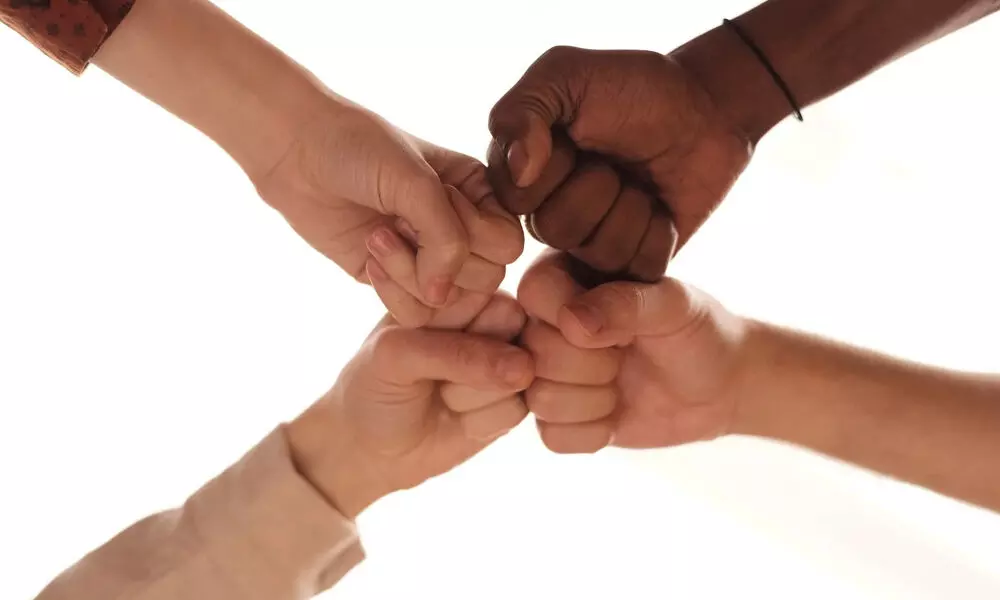Live
- Three persons admitted to hospital for diarrhea treatment
- First Star Outside Milky Way Captured: WOH G64 is 2,000 Times Larger Than the Sun
- Sikkim govt to constitute state Niti Ayog: CM Tamang
- CBI books Rajasthan narcotics inspector for Rs 3 lakh bribe
- Rajasthan bypolls: A tough contest between BJP and Congress
- Albania joins SEPA, paving way for EU integration
- Japanese government approves 250-billion USD economic package to ease price pain
- Six pharma companies to set up their units in Telangana
- The Unstable Events of a 17-Wicket Day in Perth: India vs Australia
- Dutch FM's Israel trip cancelled after Netanyahu's arrest warrant
Just In
Passing the torch: How to Teach Your Kids to Be Charitable


Passing the torch: How to Teach Your Kids to Be Charitable
When you first held your child and looked into their eyes, you likely weren’t thinking about perfect grades, ivy league colleges, or flashy cars. Instead, most new parents envision a world where their child is loved, supported, and above all, happy.
When you first held your child and looked into their eyes, you likely weren't thinking about perfect grades, ivy league colleges, or flashy cars. Instead, most new parents envision a world where their child is loved, supported, and above all, happy.
We would argue that being happy means paying it forward and showcasing that anyone can positively impact another. However, being charitable is a trait that needs to be learned, and ideally, this starts from a young age. If you are interested in passing the torch and teaching your kids to be charitable, read on to learn more.
Show Them
Children are more receptive to mimicking your actions than following through on your words. For example, if they see you being charitable, they are much more likely to do so themselves. Charity doesn't always have to entail giving money or physical possessions, but rather about putting a smile on another person's face, and making them feel appreciated or valued. In this sense, you can better show how a three-year-old also has the power to make someone's day brighter by saying hello, smiling at a stranger, or being friendly to a child sitting on their own.
Talk It Out
Do you discuss topics with your children at the dinner table? If you pass a homeless person, do you try to shelter them from view, or do you ask your child how they might help in a small way? Children can be amazingly empathetic and can teach many adults a thing or two about being nicer. We don't think that your child will solve the world's problems, but great parenting involves breaking down the problem into manageable components where they could make a difference.
Involve Them
You may annually donate to cancer research since your father or loved one was diagnosed. However, though this charity is near to your heart, it could be too abstract for a child to comprehend. This might be especially true if they have never met someone with cancer or understood the disease.
By involving your child in choosing their own charitable cause, they will feel ownership for their actions. Consider finding a donation center near you and having your child donate their toddler bed, dollhouse, or other furniture pieces that are no longer needed. You could also call a donation center to pick up an operational but used washer, dryer, or refrigerator after replacing it with a newer model. As we mentioned earlier, it is about showing your children charitable actions and talking it out with them.
New Traditions
Every tradition starts somewhere, and there is no reason you can't start a new one with your own family. One family we spoke to has their child choose six of their toys every year that they will donate to children in need before Christmas. Another family started by having their children help them fill shoeboxes when they were young. Now, as teenagers, their kids involve the entire neighborhood in the tradition.
Random acts of kindness, thoughtful actions and charitable donations are all important to showcase the next generation. If you envision a better world for your child, then consider finding age-appropriate ways to involve your entire family to make a difference in the world around us.

© 2024 Hyderabad Media House Limited/The Hans India. All rights reserved. Powered by hocalwire.com






